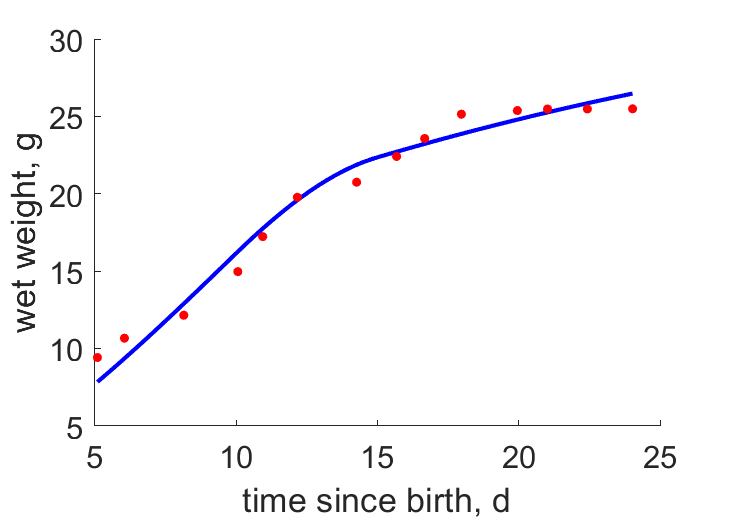Predictions & Data for this entry
| Model: std | climate: A, Cwa, Cwb | migrate: | phylum: |
| COMPLETE = 2.5 | ecozone: TN | food: biCi, biHs | class: |
| MRE = 0.032 | habitat: 0iTg, 0iTi | gender: Dg | order: |
| SMSE = 0.004 | embryo: Tnpf | reprod: O | family: |
Zero-variate data
| Data | Observed | Predicted | (RE) | Unit | Description | Reference |
|---|---|---|---|---|---|---|
| ab | 15 | 15.21 | (0.01409) | d | age at birth | avibase |
| tx | 24 | 24.01 | (0.0003081) | d | time since birth at fledging | avibase |
| tp | 72 | 69.77 | (0.03101) | d | time since birth at puberty | guess |
| tR | 365 | 365 | ( 0) | d | time since birth at first brood | guess |
| am | 2190 | 2163 | (0.01223) | d | life span | guess |
| Ww0 | 2.8 | 2.327 | (0.1688) | g | initial wet weight | avibase |
| Wwb | 1.7 | 1.719 | (0.01134) | g | wet weight at birth | guess |
| Wwi | 30.4 | 31.21 | (0.02666) | g | ultimate wet weight | avibase |
| Ri | 0.01027 | 0.01018 | (0.009189) | #/d | maximum reprod rate | avibase |
Uni- and bivariate data
| Data | Figure | Independent variable | Dependent variable | (RE) | Reference |
|---|---|---|---|---|---|
| tW |  | time since birth | wet weight | (0.0389) | Scha1953 |
Pseudo-data at Tref = 20°C
| Data | Generalised animal | Tersina viridis | Unit | Description |
|---|---|---|---|---|
| v | 0.02 | 0.03139 | cm/d | energy conductance |
| p_M | 18 | 468.5 | J/d.cm^3 | vol-spec som maint |
| k_J | 0.002 | 0.02001 | 1/d | maturity maint rate coefficient |
| k | 0.3 | 0.3124 | - | maintenance ratio |
| kap | 0.8 | 0.9553 | - | allocation fraction to soma |
| kap_G | 0.8 | 0.8008 | - | growth efficiency |
| kap_R | 0.95 | 0.95 | - | reproduction efficiency |
Discussion
- Body temperature is lower just after hatching
- mod_1: Pseudo-data point k is used, rather than k_J; Data set tp and parameter t_R are added, the latter replacing clutch interval t_N. Postnatal T is based on PrinPres1991, see get_T_Aves. See further the revision page, theme puberty
Bibliography